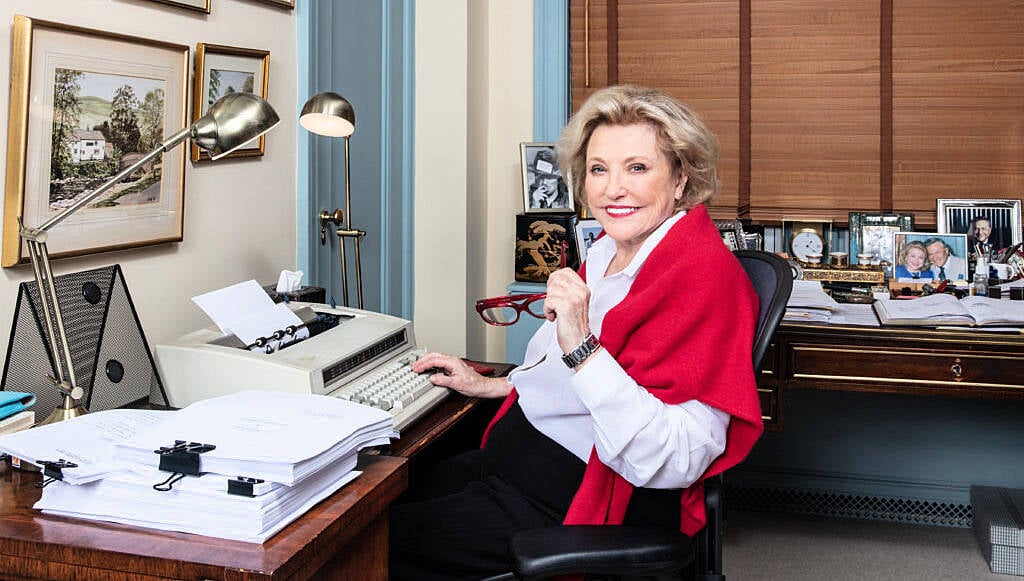
Veteran New York Post columnist Andrea Peyser, who started at the tabloid in 1989, is once again going after lifestyle guru Martha Stewart following the release of the new Netflix documentary Martha . The film chronicles Stewart’s rise to billionaire homemaker icon followed by her subsequent very public fall. In 2004, she was convicted on charges of obstruction of justice and lying to investigators as part of an insider-trading scandal that caused her to spend five months in prison.
(Stewart maintains her innocence to this day.) Peyser covered the high-profile trial for the Post as a columnist, spending every day in court in order to produce a series of ruthless front-page takes about the Stewart scandal. In just one article that gives you some idea of the tenor of Peyser’s coverage, she described Stewart as “looking like a gardener who moonlights as a dominatrix” and said she was playing the “girly card” in order to win the jury’s sympathy — but concealing what a real monster she was.

“For once, I got close enough to see her for what she really is,” Peyser wrote. Peyser’s coverage of the Stewart trial earned her something of a reputation; the Washington Post described her as “the paper’s leading downward-mobility pundit,” while New York Magazine dubbed her the “Madame Defarge of the New York Post ,” a Charles Dickens villain who channels populist rage against her enemies. Evidently, Stewart also had some thoughts about Peyser.
In the documentary, as she describes the moment the guilty verdict came in, Stewart recalls, the “New York Post lady was there, just looking so smug. She had written horrible things during the entire trial.” “But she is dead now, thank goodness,” Stewart says in the documentary.
“And nobody has to put up with the crap she was writing all the time.” In a Post column on November 7, a week after the doc’s release, Peyser had a message of her own for Stewart: “I’m alive, bitch!” Speaking with Vulture, Peyser shares her memories of her beef with Martha and what it’s like to come back from the dead. Thanks for speaking with me.
I appreciate you taking the time in what’s probably been a funny couple of days for you. It’s been crazy. I have to say, New York Magazine has not always been that nice to me , but I’m gonna give it another shot.
What are you referring to specifically? I could give you a list . Well, I’ll start by noting that you’re alive! How does it feel to be back from the dead? Oh, yeah, it feels great! I didn’t know if Martha had a death wish for me or if I should get an order of protection. Crazy.
How did you hear about her comments in the documentary? Somebody alerted me to it; they had seen the documentary. So of course I had to see it. And I was like, Wow .
I’m just surprised. She’s very successful, she’s been through a lot of stuff, and why she should concentrate on me is kind of gobsmacking. Tell me about your impressions of the documentary.
Look, I have my opinions about Martha. They did a lot to showcase her innocence. I can’t really comment on another person’s take on her.
You know, I have mine; they have theirs. Do you think it was too sympathetic to her? I don’t have a problem with that. I mean, people think that, but I don’t know that it was represented.
They’re doing their thing, and that’s fine with me. How did you start covering Martha? I was a columnist already at that point so I was there to give my opinion, my impressions. I was very surprised about what a rich vein of stuff there was to write about.
I walked into this thinking it was going to be a dry financial sort of thing. I was very surprised by how fascinating it really was. What was it like being there in court? Her defense basically boiled down to the fact that she is a “bitch,” they said, but that does not make her guilty! So that was kind of hilarious.
The trial just got stranger and stranger: her celebrity friends — I think I mentioned Bill Cosby was there, Rosie O’Donnell; her imperious nature; the way the court officers swept off the sidewalk for her. She stopped traffic at one point to get her limo out of the courthouse and I think stopped an ambulance. She was really treated like the star she thought she was.
Martha was obviously not happy with what you were writing. Did she or her publicists say anything to you at the time? Oh, no, nobody spoke to me. Much of the media was very much sympathetic to her.
I got along with them — we disagreed, but I got along with them. But Martha, no, she did not talk to people like me. I talked to her celebrity row — her petting zoo of celebrities that came every day — and I would talk to her, and she would kind of look at me like I was a bug.
She says she was a victim of an unfair prosecution and an unfair press. What do you make of that? I think that’s what she thinks. The prosecution did a very good job.
They could not overcharge her. They did not do what I did: They did not take personal shots at her. The evidence showed that she was guilty, and the jury found that as well.
I’m not a financial reporter, but it was very clear that this is not a good thing for financial institutions, that it could damage them, that behaving as she did is not a good thing for our country. And I agreed with that. They didn’t go after her on any personal basis.
They just tried to make it a very sober recounting of what happened, of what she did, and she’s never accepted that. I’ve never seen a minute of remorse or acceptance that she did anything wrong. That’s not right.
How would you describe the tone of your coverage of her or the stories that you wrote? That’s up to the reader. I can’t really say. I guess I would say you were pretty ruthless.
I’m just looking at one story you wrote. You described her as “looking like a gardener who moonlights as a dominatrix,” and you said she was “the queen of control freaks.” Looking back on those words, are you comfortable with them today? It’s what I saw there.
That’s how I put it. Perhaps it was colorful, but I think she could take it. Did you worry or were you conscious that you might be trying to hold her to a different standard than a man in her position? That’s something she alluded to in the documentary.
That’s what people say, isn’t it? I think I treat everybody equally regardless of gender or wealth. I don’t think I treated her any differently than I would anybody else who I found entitled and not accepting that they did anything wrong. Those are the issues that affect people rather than what gender they are or anything like that.
She says in the documentary that you were smug when the verdict was handed down — that you looked smug. Were you? I don’t remember being smug. I don’t understand why she would be looking at me at that point.
Who am I? I’m just an observer. But I guess given the stories you’d written, you probably did feel somewhat satisfied that your take ended up being correct and that she was found guilty? Of course, yeah. Who doesn’t appreciate being right? Why do you think the trial proved so popular with readers? Is it just schadenfreude about a celebrity’s downfall? No, I don’t think so.
I think it was maybe satisfaction that somebody so imperious and superior and — to use the word — smug is found guilty. It’s not that we’re celebrating her guilt. We’re just saying, “You are a person, and if you did something wrong, own up to it.
” Since Martha got out of prison 20 years ago, she’s sort of reinvented herself, especially lately, in the public eye. What have you made of her new image? It’s very clever. She’s going for the youth vote now.
She did a roast for Justin Bieber. She’s hanging out with rappers like Snoop Dogg. It’s not what you would expect from an 83-year-old.
And I guess it’s very witty. I watched some segments and it was very funny. You called her a bitch in the Post in the story that’s out today, as well as on social media.
Why do you think she’s a bitch? Well, that’s the word that was used by her defense attorneys about their own client! I didn’t invent the word, and I didn’t invent it in reference to Martha as well. How does it feel to know you’ve been sort of living in her head rent-free for all this time? It’s kind of amazing. And I guess I feel sorry for her in a way.
I don’t know why that would be the case. Maybe because I was about the only one who went against her, and she can’t handle that, because she would like to always be right. I don’t know.
I can’t psychoanalyze her..













